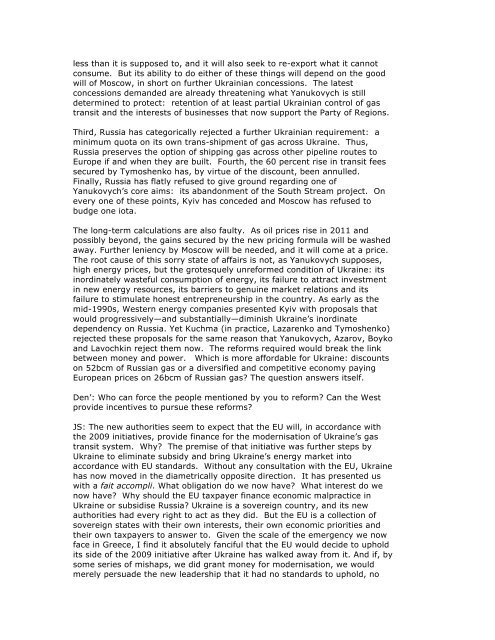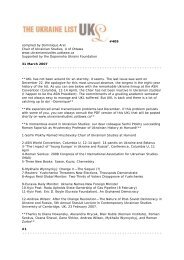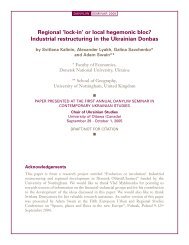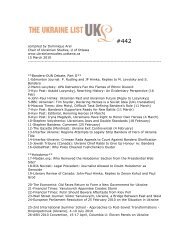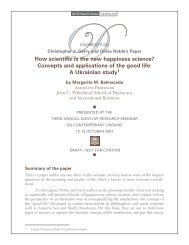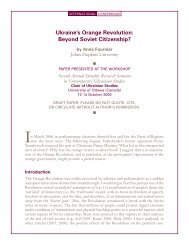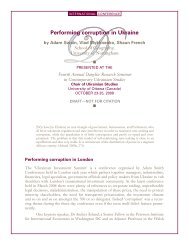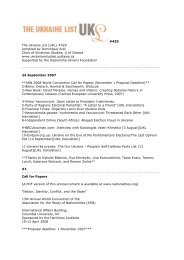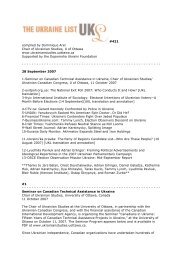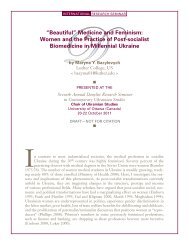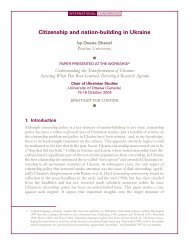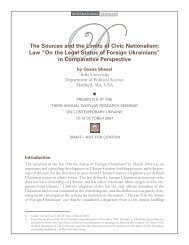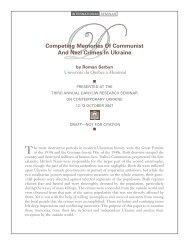UKL444 - Chair of Ukrainian Studies
UKL444 - Chair of Ukrainian Studies
UKL444 - Chair of Ukrainian Studies
Create successful ePaper yourself
Turn your PDF publications into a flip-book with our unique Google optimized e-Paper software.
less than it is supposed to, and it will also seek to re-export what it cannot<br />
consume. But its ability to do either <strong>of</strong> these things will depend on the good<br />
will <strong>of</strong> Moscow, in short on further <strong>Ukrainian</strong> concessions. The latest<br />
concessions demanded are already threatening what Yanukovych is still<br />
determined to protect: retention <strong>of</strong> at least partial <strong>Ukrainian</strong> control <strong>of</strong> gas<br />
transit and the interests <strong>of</strong> businesses that now support the Party <strong>of</strong> Regions.<br />
Third, Russia has categorically rejected a further <strong>Ukrainian</strong> requirement: a<br />
minimum quota on its own trans-shipment <strong>of</strong> gas across Ukraine. Thus,<br />
Russia preserves the option <strong>of</strong> shipping gas across other pipeline routes to<br />
Europe if and when they are built. Fourth, the 60 percent rise in transit fees<br />
secured by Tymoshenko has, by virtue <strong>of</strong> the discount, been annulled.<br />
Finally, Russia has flatly refused to give ground regarding one <strong>of</strong><br />
Yanukovych’s core aims: its abandonment <strong>of</strong> the South Stream project. On<br />
every one <strong>of</strong> these points, Kyiv has conceded and Moscow has refused to<br />
budge one iota.<br />
The long-term calculations are also faulty. As oil prices rise in 2011 and<br />
possibly beyond, the gains secured by the new pricing formula will be washed<br />
away. Further leniency by Moscow will be needed, and it will come at a price.<br />
The root cause <strong>of</strong> this sorry state <strong>of</strong> affairs is not, as Yanukovych supposes,<br />
high energy prices, but the grotesquely unreformed condition <strong>of</strong> Ukraine: its<br />
inordinately wasteful consumption <strong>of</strong> energy, its failure to attract investment<br />
in new energy resources, its barriers to genuine market relations and its<br />
failure to stimulate honest entrepreneurship in the country. As early as the<br />
mid-1990s, Western energy companies presented Kyiv with proposals that<br />
would progressively—and substantially—diminish Ukraine’s inordinate<br />
dependency on Russia. Yet Kuchma (in practice, Lazarenko and Tymoshenko)<br />
rejected these proposals for the same reason that Yanukovych, Azarov, Boyko<br />
and Lavochkin reject them now. The reforms required would break the link<br />
between money and power. Which is more affordable for Ukraine: discounts<br />
on 52bcm <strong>of</strong> Russian gas or a diversified and competitive economy paying<br />
European prices on 26bcm <strong>of</strong> Russian gas? The question answers itself.<br />
Den’: Who can force the people mentioned by you to reform? Can the West<br />
provide incentives to pursue these reforms?<br />
JS: The new authorities seem to expect that the EU will, in accordance with<br />
the 2009 initiatives, provide finance for the modernisation <strong>of</strong> Ukraine’s gas<br />
transit system. Why? The premise <strong>of</strong> that initiative was further steps by<br />
Ukraine to eliminate subsidy and bring Ukraine’s energy market into<br />
accordance with EU standards. Without any consultation with the EU, Ukraine<br />
has now moved in the diametrically opposite direction. It has presented us<br />
with a fait accompli. What obligation do we now have? What interest do we<br />
now have? Why should the EU taxpayer finance economic malpractice in<br />
Ukraine or subsidise Russia? Ukraine is a sovereign country, and its new<br />
authorities had every right to act as they did. But the EU is a collection <strong>of</strong><br />
sovereign states with their own interests, their own economic priorities and<br />
their own taxpayers to answer to. Given the scale <strong>of</strong> the emergency we now<br />
face in Greece, I find it absolutely fanciful that the EU would decide to uphold<br />
its side <strong>of</strong> the 2009 initiative after Ukraine has walked away from it. And if, by<br />
some series <strong>of</strong> mishaps, we did grant money for modernisation, we would<br />
merely persuade the new leadership that it had no standards to uphold, no


